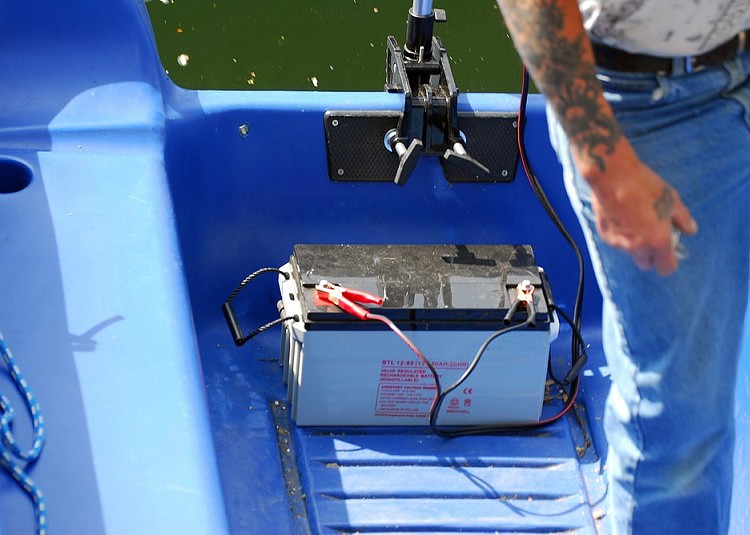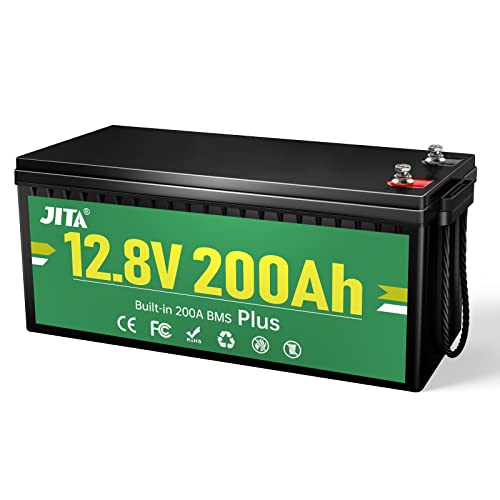Trolling motors, of course, are made for use in the water. But what about the batteries that power them?
Most batteries used for trolling motors are classified as either marine or deep cycle batteries and sometimes both. Are these batteries waterproof? Can they handle being dunked in the water or getting rained on?
How does the usual amount of spray from waves or rapids affect your battery? Is saltwater more damaging than freshwater? Are there any precautions you should take to protect your battery from water exposure?
Keep reading!
In this article, we’ll discuss everything you need to know about keeping your trolling motor battery safe around water.
Table of Contents
Can a Trolling Motor Battery Get Wet?
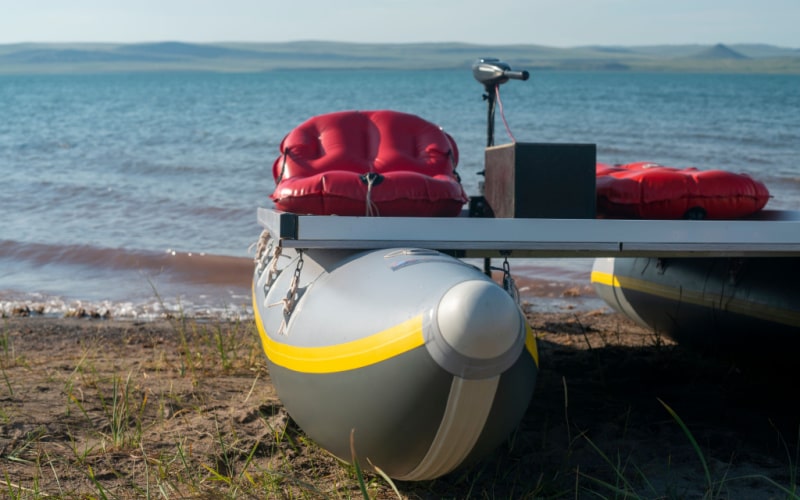
It depends on the type and quality of the battery, but in general, getting a trolling motor battery wet will shorten its lifespan. Even a high-quality marine battery isn’t supposed to get wet, though it can handle a small amount of spray without any negative effects.
In a general sense, any water on the battery may create electrical pathways which cause it to leak charge, draining the battery more quickly than it should. This is especially true if water leaks in through the terminal housing.
Think of it this way: your trolling motor and anything else hooked up to the battery are already pulling electricity from the battery. The battery slowly discharges as it powers these devices.
Any water on the battery will also pull electricity from the battery, as though the water itself is “drawing power.” This wastes your battery charge, puts an extra strain on the battery, and causes it to discharge sooner than it would in dry conditions.
Even the battery base, which is more protected than other parts, can leak a charge if it sits in a puddle of water or faces too great an exposure.
Getting the battery wet can cause erosion, which in turn will probably cause it to stop working before its time. Surface erosion can lead to water getting under the surface, which may cause deeper, more permanent damage within a matter of days, weeks, or months.
Saltwater, in particular, can interfere with a battery’s electrical system, not only causing erosion but producing dangerous shorts in the battery.
Regardless of whether you’re out on the local pond in a rainshower or out on the ocean, it’s best to use a battery box to help shield the battery from as much water exposure as possible.
Can Trolling Motor Batteries Be Submerged in Water?
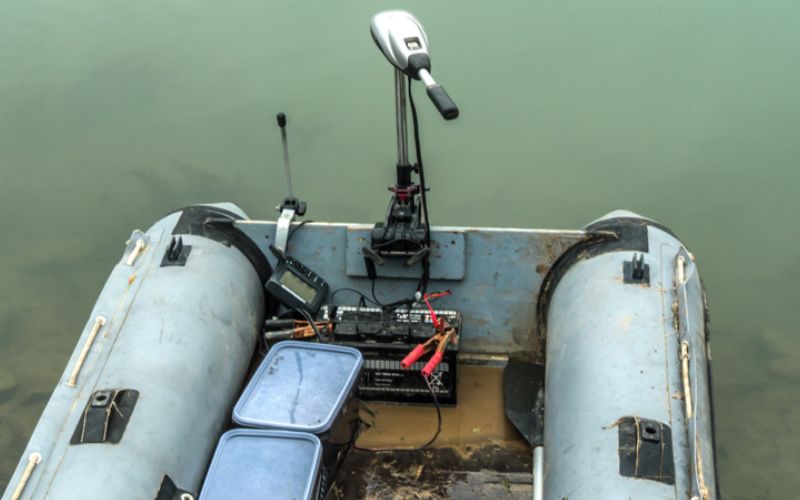
No trolling motor battery, even those labeled waterproof, should ever be submerged in water. Though getting splashed with small amounts of water won’t damage most batteries, submerging them completely will cause immediate damage, most likely beyond repair.
Trolling motor batteries are made for outdoor use, but they are not completely sealed. Water can get in through cracks and crevices in the outer casing, reaching the more sensitive and active components inside.
What’s more, simply having all that water touching the battery will cause it to leach electrical power in all directions and at an alarming speed. This will drain the charge almost immediately.
If marine or deep-cycle batteries are dunked in water, the water will quickly flood the battery, shorting it out and causing irreparable damage.
Can You Leave a Trolling Motor Battery in the Rain?
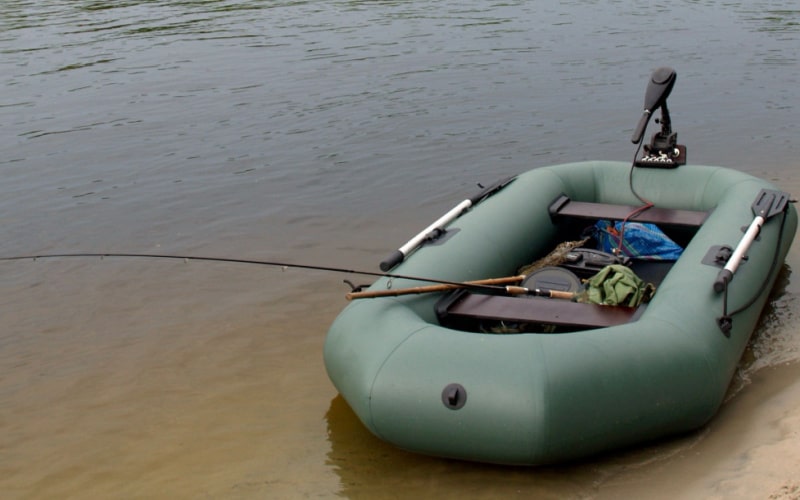
Most trolling motor batteries can handle a small amount of water exposure from spray or light rain, but it’s up to you whether to decide to take the risk or not.
Generally, it’s not a good idea to leave your battery out in the rain, especially if you’re expecting very heavy rains, strong storms, or extreme temperatures. It also depends on the quality and design of the battery.
Some batteries are better made than others and can handle a bit more moisture. These are often marketed as waterproof batteries, and they can handle being out in the rain as well as getting splashed repeatedly.
If you do a lot of fishing or boating in extreme weather conditions where the battery frequently gets rained on or splashed with spray, it’s best to use a waterproof battery. But even if you have a waterproof battery, it’s best to limit rain and spray exposure if possible.
Which Deep-Cycle Batteries are Waterproof?
More and more marine batteries are being designed with better waterproof qualities, making them safer for outdoor and water uses in general. Let’s talk about three of the best waterproof deep-cycle batteries on the market:
1. Ampere Time LiFePO4 Deep-Cycle Battery
No products found.
Like all of the batteries on this list, this battery is a lithium iron phosphate battery. These are some of the safest lithium batteries available.
This Ampere Time battery is a 12V, 200Ah battery known for its waterproof qualities. It has many outdoor applications and can be used as a marine battery to operate boats, trolling motors, and other on-board functions.
It can be charged and discharged for more than 2,000 cycles and will last for years if properly cared for. The battery’s main drawback is its steep price tag.
2. CHINS LiFePO4 Deep-Cycle Battery
Last update on 2026-02-21 at 09:08 / Affiliate links / Images from Amazon Product Advertising API
Another top-quality lithium iron phosphate battery, this offering from the CHINS brand is very similar to the Ampere Time battery above. It has the same style and design, as well as similar specifications.
This battery is effective for both indoor and outdoor uses, as it is fully waterproof and can handle quite a bit of moisture.
Again, you can expect to pay a pretty penny for this battery, but if you want a top offering that is safe to use around water, this deep-cycle battery is worth considering.
3. JITA LiFePO4 Deep-Cycle Battery
Last update on 2026-02-24 at 17:17 / Affiliate links / Images from Amazon Product Advertising API
This 12V, 200Ah battery boasts an impressive 400A max and 2,000-5,000 charge-discharge cycles. It is nearly the same size as the two batteries above but weighs a few pounds less.
This battery also costs a little less than those discussed above, though it is still pretty expensive so the price difference may be negligible. Still, if you’re looking for a quality waterproof battery, check out this offering from JITA as you shop around.
Conclusion
In general, most trolling motor batteries can handle a little bit of spray or rain, but you should try to limit water exposure as much as possible. Repeated or extreme exposures can easily cause permanent damage to the battery.
Waterproof batteries can handle a greater amount of water exposure, but you should still take care to limit the exposure. No battery, even those marketed as waterproof, should ever be submerged underwater.

I created this site to help people – to help you – with your boat problems. Instead of helping one person at a time, I want this website to be the “one-stop-shop” for everyone’s boating concerns. Read more.

